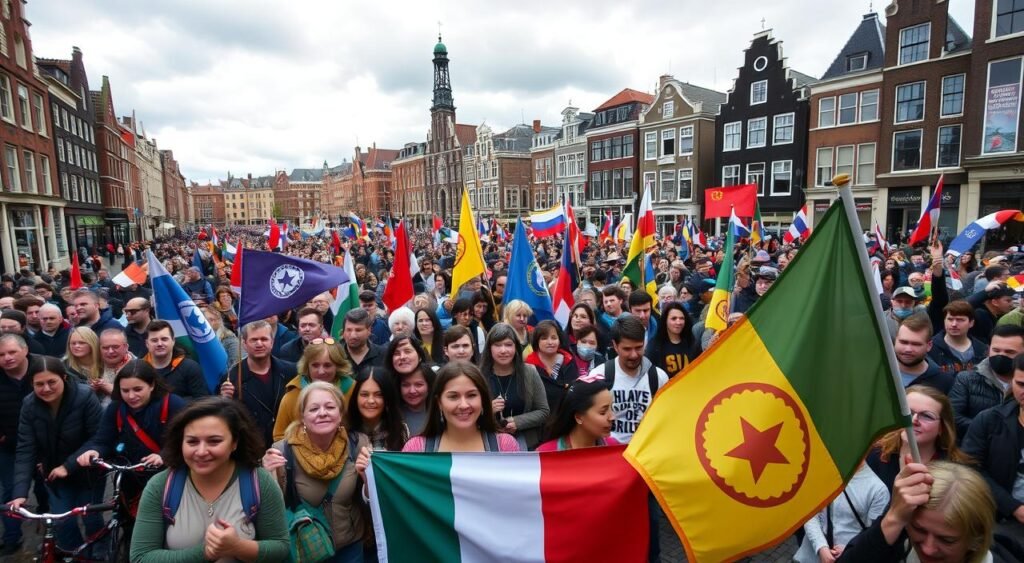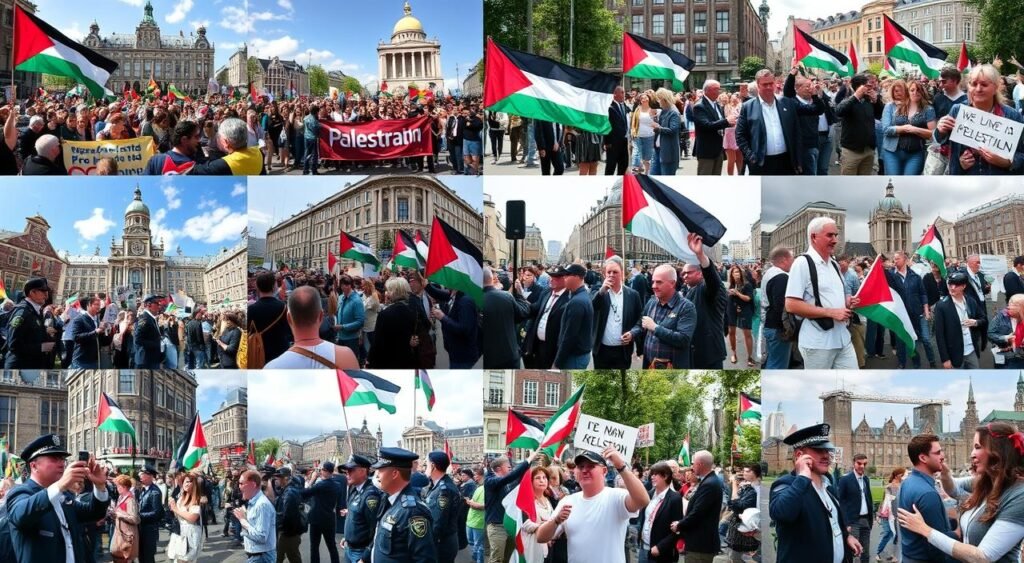Several pro-Palestinian protesters were arrested in Amsterdam for an unauthorized protest at Dam Square. This shows the tension between the right to peaceful assembly and public safety concerns.

The protesters showed solidarity with the Palestinian cause, despite a ban on public gatherings. Amsterdam’s authorities wanted to keep the peace and avoid disruptions.
The arrest of these activists brings up a big question. It’s about balancing the right to free speech and assembly with keeping everyone safe. This shows the tough choices local authorities face.
Table of Contents
Background of Amsterdam’s Protest Ban and Restrictions
Amsterdam’s rules on protests aim to keep the peace and protect everyone. The city’s laws set limits on where and when people can gather. This balance is key to keeping the city safe and orderly.
Legal Framework Behind the Ban
The Dutch constitution protects the right to hold demonstrations. But, Amsterdam can limit these rights for safety and order. The city can say no to a protest if it might cause trouble or danger.
Previous Protest History in Amsterdam
Amsterdam has seen many protests over the years. Most have been peaceful, but some have turned violent. These incidents have made the city more cautious about big gatherings.
City’s Safety Concerns and Decisions
The city wants to keep everyone safe and the streets clear. So, it has rules for protests. This includes needing a permit and keeping some areas off-limits. These rules have led to debates about freedom of speech and safety.

“The right to protest is a fundamental freedom, but it must be exercised in a way that does not compromise public safety or disrupt the daily life of our city,” stated a spokesperson for the Amsterdam municipality.
Timeline of Pro-Palestinian Demonstration Events
The pro-Palestinian protest in Amsterdam’s Dam Square on May 18th, 2023, was a big deal. It caught the world’s eye. A group of local activists planned it well. They used social media to get people together.
The protest unfolded like this:
- At 2:00 PM, the first wave of protesters started gathering in Dam Square. About 2,000 people were there.
- Then, more and more people came. Soon, there were about 5,000 activists in the square. They heard about the protest on social media.
- As the protest grew, people started marching. They chanted slogans and waved pro-Palestinian flags and banners.
- Police stepped in around 4:30 PM. They tried to break up the crowd and follow the city’s rules.
- Things got tense. Some people were arrested for not leaving when told to.
The timeline shows how well the activists planned and how the city reacted. It’s clear how the situation changed over time.
| Timeline of Events | Participant Numbers | Police Intervention |
|---|---|---|
| 2:00 PM – Initial Gathering | ~2,000 protesters | No intervention |
| 3:00 PM – Crowd Expansion | ~5,000 protesters | No intervention |
| 4:30 PM – Police Intervention | ~5,000 protesters | Attempt to disperse the crowd |
| 4:45 PM – Clashes and Detentions | ~5,000 protesters | Arrests and detentions of protesters |

Police Response and Detention Procedures
When the unauthorized pro-Palestinian protest happened in Amsterdam, police used many tactics to control the crowd. They used barriers, barricades, and physical restraints to keep the protesters in check. This was to stop any trouble or escalation.
Reports say over 180 demonstrators were arrested for breaking the protest ban. The arrested were taken to detention centers for processing. Police carefully documented their personal info, charges, and any evidence found.
Legal Consequences for Protesters
Those arrested might face legal consequences for joining the banned protest. Authorities say they could be charged with things like public order violations and resisting arrest. The legal representation of the arrested will be key in deciding their fate.
- Potential charges: public order violations, failure to comply with police instructions, resisting arrest
- Legal representation will be crucial in determining penalties or convictions
- Protest policing strategies aimed to maintain public safety and prevent disruption
The police actions and detention procedures are being closely watched and debated. The long-term implications of this event on the pro-Palestinian movement in the Netherlands are still unclear.
International Reactions and Media Coverage
The arrests of pro-Palestinian protesters in Amsterdam have sparked a global response. Governments, human rights groups, and media have all spoken out. They are concerned about press freedom and the city’s protest restrictions.
Human rights organizations like Amnesty International and Human Rights Watch have condemned the detentions. They say it’s a violation of the right to peaceful assembly. Many on social media have shown support for the protesters and criticized the Dutch authorities.
International media, including the New York Times, the Guardian, and the Al Jazeera, have covered the story in detail. They’ve reported on the protests, the police response, and the global reaction. Their reports have raised questions about protest rights and journalists’ freedom to report.
Governments worldwide have also made statements. Some have condemned the crackdown and urged the Dutch to respect protest rights. These statements show the incident’s global importance and its impact on how people view the Netherlands.
The media coverage and international reaction to the Amsterdam protests highlight their global significance. They draw attention to the challenges faced by those fighting for freedom of expression and assembly.
| Organization | Response |
|---|---|
| Amnesty International | Condemned the detentions as a violation of the right to peaceful assembly. |
| Human Rights Watch | Criticized the Dutch authorities’ actions and called for respect of protest rights. |
| New York Times | Provided detailed coverage of the events and their global implications. |
| Guardian | Reported on the protests and the international response, highlighting concerns about press freedom. |
| Al Jazeera | Covered the incident, drawing attention to the diplomatic statements condemning the crackdown. |
Impact on Pro-Palestinian Movement in Netherlands
The arrest of pro-Palestinian protesters in Amsterdam has deeply affected civil liberties and protest rights in the Netherlands. The community’s resilience has brought attention to the future of protests and the legal battles against the protest ban.
Community Response and Support
The pro-Palestinian community in the Netherlands has come together in solidarity. Local groups and activists are supporting those arrested. This unity shows the movement’s strength and determination to fight for their rights.
Future of Protest Rights
The protest ban in Amsterdam has raised concerns about protest rights in the Netherlands. Legal experts and civil rights groups say the ban limits freedom of speech and assembly. They believe it threatens the democratic society’s core.
Legal Challenges to the Ban
Legal appeals have been filed to challenge the protest ban. Activists are fighting to protect their right to peaceful demonstrations. The outcome of these legal battles will shape the future of protest movements in the Netherlands.
“The right to protest is a fundamental pillar of our democracy. We will not be silenced, and we will continue to fight for the rights of our community.”
– Local Activist
Conclusion
The recent pro-Palestinian protest in Amsterdam shows a tough balance between safety and freedom of assembly. The city banned the protest to keep order and security. But, this move has started a big debate on its success and its impact on civil rights.
The civil disobedience, with protesters detained, shows the struggle between safety and freedom. The Netherlands must find a way to balance these two important values. This is key to resolving the current tensions.
The effects of the ban and arrests on future protests in Amsterdam and the Netherlands will be watched closely. Legal fights against the ban and the community’s push for their rights will influence civil liberties. They will also affect the balance between safety and freedom in the area.
YOU MAY ASO LIKE THIS Iran und Israel: Erkundung der Beziehungen im Nahen Osten
FAQ
What is the legal framework behind the protest ban in Amsterdam?
The protest ban in Amsterdam is based on local laws and public safety. The Dutch constitution allows for freedom of assembly. But, local authorities can limit this right to keep the public safe.
What was the history of protests in Amsterdam prior to the recent events?
Amsterdam has seen many political demonstrations, including pro-Palestinian rallies. The city has banned public gatherings before. This was due to concerns over public order and security risks.
What were the specific safety concerns that led to the protest ban at Dam Square?
The city authorities were worried about potential clashes and disruptions. They also feared the spread of COVID-19. These were the reasons for banning the pro-Palestinian protest at Dam Square.
How did the pro-Palestinian demonstration at Dam Square unfold?
Despite the ban, pro-Palestinian activists still gathered at Dam Square. This led to a tense standoff with the police. Protesters ignored the restrictions, and several were detained by law enforcement.
What tactics did the police use to manage the unauthorized protest?
The police used crowd control measures to disperse the protesters. They used riot gear and vans to make arrests. Their goal was to keep the public order and enforce the ban.
How many protesters were arrested, and what were the legal consequences?
Several pro-Palestinian demonstrators were detained by the police. The exact number of arrests is not confirmed. The legal consequences for the protesters are still unclear.
What was the international response to the arrests of pro-Palestinian protesters in Amsterdam?
The arrests drew attention from international human rights organizations and foreign governments. Media outlets also covered the event. It sparked discussions about public safety and the right to freedom of assembly.
How did the pro-Palestinian movement in the Netherlands respond to the arrests?
The pro-Palestinian community in the Netherlands showed solidarity with the detained. They vowed to continue their activism. The arrests have raised concerns about protest rights and potential legal challenges to the ban in Amsterdam.
